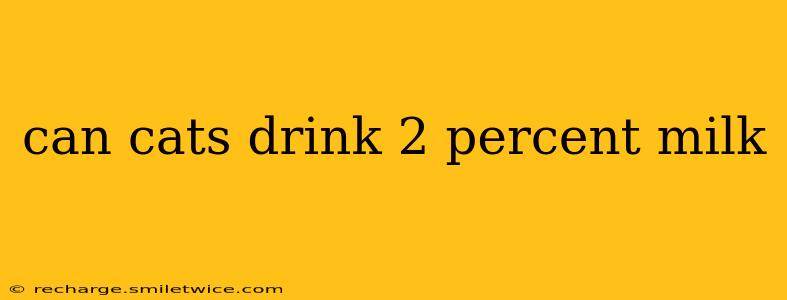Can Cats Drink 2% Milk? The Truth About Dairy and Feline Digestion
The short answer is: no, cats shouldn't drink 2% milk, or any cow's milk for that matter. While a tiny lick might not cause immediate harm, regular consumption of cow's milk can lead to several digestive issues for cats. This is because cats, unlike humans, lack the enzyme lactase, which is necessary to break down lactose, the sugar found in milk.
This lack of lactase means that lactose passes undigested through their digestive system. This can result in a range of unpleasant symptoms, making it crucial to understand why dairy isn't a good choice for our feline friends.
Why is Cow's Milk Bad for Cats?
The primary reason cow's milk is problematic for cats is the lactose intolerance mentioned above. Undigested lactose ferments in the gut, causing a variety of digestive upset symptoms. These can include:
- Diarrhea: This is a common symptom and can lead to dehydration if severe.
- Vomiting: Another frequent reaction to lactose intolerance in cats.
- Gas: The fermentation process produces gas, leading to discomfort and bloating.
- Stomach upset: General discomfort and abdominal pain are common experiences.
What About Other Types of Milk?
The issue isn't just limited to 2% milk. This applies to whole milk, skim milk, and other types of cow's milk. While some cats may tolerate small amounts better than others, the risk of digestive problems remains.
What Can Cats Drink Instead of Milk?
Cats should always have access to fresh, clean water. This is their primary source of hydration. However, if you're looking for alternatives to water for occasional treats (remember, treats should be occasional), consider:
- Cat-specific milk alternatives: These are formulated to be lactose-free and nutritionally appropriate for cats. Always check the ingredients to ensure they are safe and suitable.
- Plain water: The best and safest option for your cat's daily hydration.
Can Kittens Drink Milk?
While kittens need extra nutrients, cow's milk is still not recommended. Their digestive systems are still developing and are even more sensitive to lactose. Their mother's milk is the best source of nutrition. If the mother is unable to nurse, consult a veterinarian to discuss the appropriate kitten formula.
My Cat Seems to Like Milk, Should I Let Them Have a Little?
While your cat might enjoy the taste of milk, the potential health risks outweigh the temporary pleasure. It's better to avoid giving your cat any cow's milk to prevent digestive issues in the long run. There are many safe and delicious treats available specifically designed for cats that are a much healthier alternative.
What Should I Do if My Cat Drinks Milk and Gets Sick?
If your cat drinks milk and experiences any of the symptoms mentioned above (diarrhea, vomiting, gas, or stomach upset), contact your veterinarian immediately. Dehydration can be a serious consequence of digestive upset, and prompt veterinary care is crucial.
By understanding the digestive limitations of cats concerning lactose, we can make informed choices to ensure their health and well-being. Providing fresh water and avoiding cow's milk is the best way to keep your feline companion happy and healthy.
